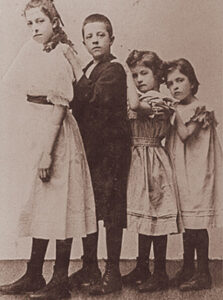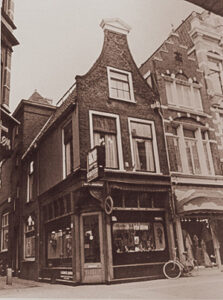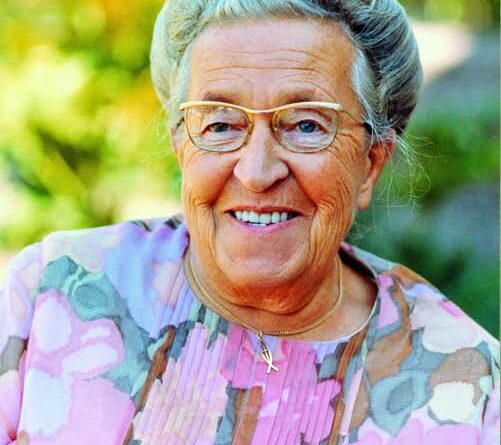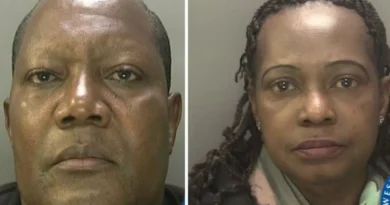CORRIE TEN BOOM’S LIFE OF FAITH IN ACTION
Corrie Ten Boom’s story is one of unshakeable faith in the face of unimaginable darkness. Have you ever wondered where people find the courage to do amazing things, even in the face of hardship? Corrie Ten Boom is one of those people whose life is a blueprint for other Christians, especially women. Therefore, She is the latest formidable woman of faith we will be featuring. Let us take a look at the exploits of this amazing woman of faith.
Corrie Ten Boom’s Early Life
Corrie Ten Boom was born on April 15, 1892, in Haarlem, Netherlands, to the family of Casper Ten Boom. She was the youngest child of her parents. Corrie’s father was a jeweler and a watchmaker, a profession she would also pick up later in life. Corrie’s elder sister got bedridden from a cold, and as a result, she joined her father in the family business.

In 1922, she became the first woman to be licensed as a watchmaker in the Netherlands. Corrie was born into a family of Calvinist Christians, and their faith required them to serve their community. Her family provided food and shelter to those in need. Right from a young age, she had been taught all lives are sacred and Jews were chosen people. This became her motivation for the selfless life she lived.
Corrie Ten Boom’s Faith in Action
In May 1940, the Germans invaded the Netherlands, banning the youth club. A woman who was a Jew sought help from the Ten Booms family, who had previously helped their Jewish neighbors. Casper, a devoted reader of the Old Testament, believed that Jews were the “chosen people” and welcomed her into their household.

The family became active in the Dutch underground, hiding refugees and honoring the Jewish Sabbath. Corrie and her sister Betsie opened their home to Jewish refugees and members of the resistance movement, which led to their being sought after by the Gestapo and its Dutch counterpart. The Dutch Resistance sent an architect to build a secret room adjacent to the room for the Jews in hiding, creating “The Hiding Place.” The secret room held six people and had a ventilation system. This hiding place was built inside Corrie’s room.
During wartime, food was scarce, so the non-Jews were given a ration card for food. Corrie, through her charitable work, knew the man in charge of the ration cards and visited him. Getting there, she was asked how many cards she wanted. She had planned to ask for five, but as she spoke, the words that came out of her mouth were “one hundred,” and she got a hundred cards.
Ten Boom’s involvement in the Dutch resistance grew beyond gathering stolen ration cards and harboring Jews in her home. She became part of the Dutch underground resistance network and oversaw a network smuggling Jews to safe places. It is estimated that around 800 Jews were saved by the Ten Boom’s efforts.
Ten Boom’s faith is tested in captivity.
On February 28, 1944, the Nazi police invaded the Ten Boom’s home and arrested Corrie and her family. About 30 people were arrested from the Ten Boom’s residence and marched to a concentration camp. Most of the arrested were released except for Corrie, her sister Betsie, and their father Casper. Ten days after the arrest, her father died in prison and she was put on trial shortly after.
During her trial, she talked about helping the mentally disabled; in her words, “A mentally disabled person might be more valuable than a watchmaker or lieutenant in God’s eyes.” Corrie and her sister remained in prison till they were transferred to a women’s labor camp in Germany. The sisters conducted worship sessions after using a bible they had managed to smuggle in. They shared the gospel in prison and quite several prisoners converted to Christianity.
However, Betsie’s health deteriorated, and she died in prison. Before she died, she told Corrie, “There’s no pit so deep that God cannot; it’s not deeper still.” In subsequent days after Betsie died, Corrie was released. She later found out her release was due to clerical error, as all the women of her age in prison were executed a week after her release. Corrie’s experiences in prison didn’t change her attitude towards Jews on the contrary, she continued taking in people in need and those in danger of execution.
Ten Boom’s Forgiving Heart
After the war, Corrie returned to the Netherlands to set up a rehabilitation centre in Bloemendaal. This centre housed concentration camp survivors and Dutch collaborators who were shunned by society. During Corrie’s detention, she experienced discrimination. The Nazi guards were exceptionally cruel, but this didn’t make her hate any of them. On one occasion, when she returned to Germany, she met two camp guards, one of whom was very cruel to her sister Betsie. Despite this, she forgave them for the unhealthy treatments they gave her and her sister in prison. She traveled the world as a public speaker, in more than 60 countries on different continents, preaching the gospel in both friendly and hostile situations, and wrote several books.
Ten Boom’s legacy
Corrie’s entire life proved that, with faith, there’s nothing that can’t be achieved. During the world wars, many people lost their faith and their humanity, but Corrie’s faith stood strong. Her exploits are an example for every Christian to always muster faith in hard times. one instance of her faith I urge every reader to renew their faith in Christ. No matter the challenges we encounter in life, keep your faith and your humanity, and you will win.
Content Credit/ Ajbola Emmanuel Adebayo
Picture Credit/ https://en.wikipedia.org/wiki/Corrie_ten_Boom




